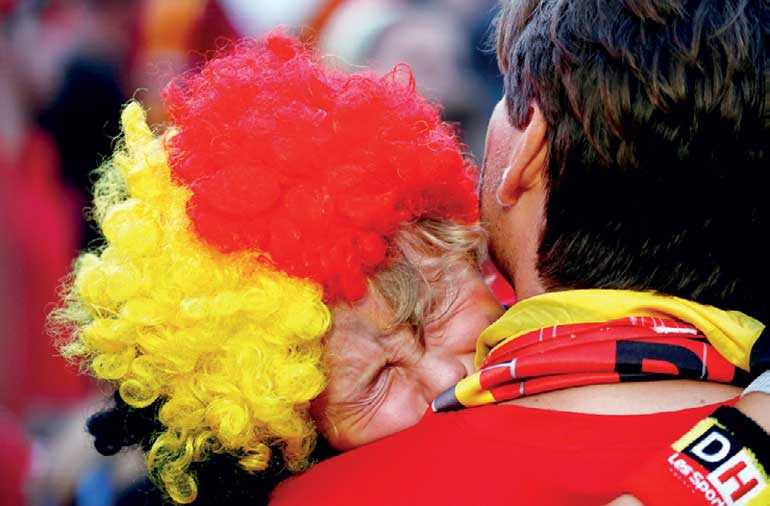Monday Feb 23, 2026
Monday Feb 23, 2026
Thursday, 12 July 2018 00:14 - - {{hitsCtrl.values.hits}}

Brussels (Reuters): Belgium’s World Cup dream is over but a fine run to a heartbreakingly narrow semi-final defeat by France at the tournament in Russia has left a feel-good glow that might just help hold the famously divided country together.
“This kind of event brings Dutch- and French-speakers together,” student Alpha Omba said after watching the national side, known as the Red Devils, lose 1-0 on Tuesday night at an outdoor screening in Brussels. “It’s really helpful.”
Despite disappointment, most of its 11 million people are happy Belgium did well, knocking out five-time champions Brazil last week. That new embrace of the team, often cited as one of the few real national institutions Belgium has left after the king, may feed into more sense of common purpose, some believe.
Few expect football to change politics quickly, but musings on the future were especially pointed on Wednesday as the Dutch-speaking half of the country marked its own “national” holiday, commemorating a 14th-century victory — over the French.
The prime minister of Flanders, Geert Bourgeois, took pains to suggest Flemish and Belgium pride could co-exist: “That’s our DNA and gives Flanders its own special form,” he said.
His N-VA party, also the biggest in the federal parliament, wants eventual independence from poorer French-speaking Wallonia. But they are wary of seeming killjoys when pride in “Belgitude” is running high — party leader Bart De Wever took flak for hanging a Flemish flag from his window on the day Belgium played Brazil.
Even in the Flemish press, one cartoon later showed De Wever cursing “I hate football!” as French-speaking federal Prime Minister Charles Michel celebrated the 2-1 win over Brazil.
Zuhal Demir, an N-VA minister in Michel’s government, told De Standaard newspaper that the party’s rivals were using the success of the multilingual, diverse national team to hurt the separatists: “Football has nothing to do with politics,” she said. “Football is a celebration, the bars are full, everyone’s happy and you can find me in front of a big screen too.”
“More fun” being Belgian
Flemish sports journalist Anouk Torbeyns had another take on how the freewheeling Red Devils with their English-only “We Are Belgium” motto, were challenging the cranky stereotypes:
“Flemings are always grumbling about absolutely everything,” she wrote. “Belgians are proud and like to party. It’s more fun being Belgian than Flemish.”
For Jean-Michel De Waele, political scientist at the French-speaking Free University of Brussels, football success has been a shot in the arm for a fragile sense of national identity: “It’s been an extraordinary excuse to have a party and shout about a collective ‘us’ that we normally lack,” he told TV5.
“In the short term, it won’t affect the political situation in the country,” he said. “In the medium and long term, maybe.” “I don’t really think that the success of the Red Devils will save Belgium,” De Waele added, but he did believe younger people, especially Dutch speakers, were developing a stronger bond to a broader national idea. “They’re the first generation since World War Two who are partying in the name of Belgium.”
The Red Devils won fans around the world with their elegant style and they also reflect a Belgium that is home to Flemings and Walloons, but also to many West and North African immigrants who take less part in those old communitarian rivalries.
“This is a new image of Belgium,” wrote Jan Segers in the Dutch-language Het Laatste Nieuws. “A country in the image of a group of talented, disciplined, creative, carefree, open-minded and ambitious young men. Wouldn’t you want to live there?”